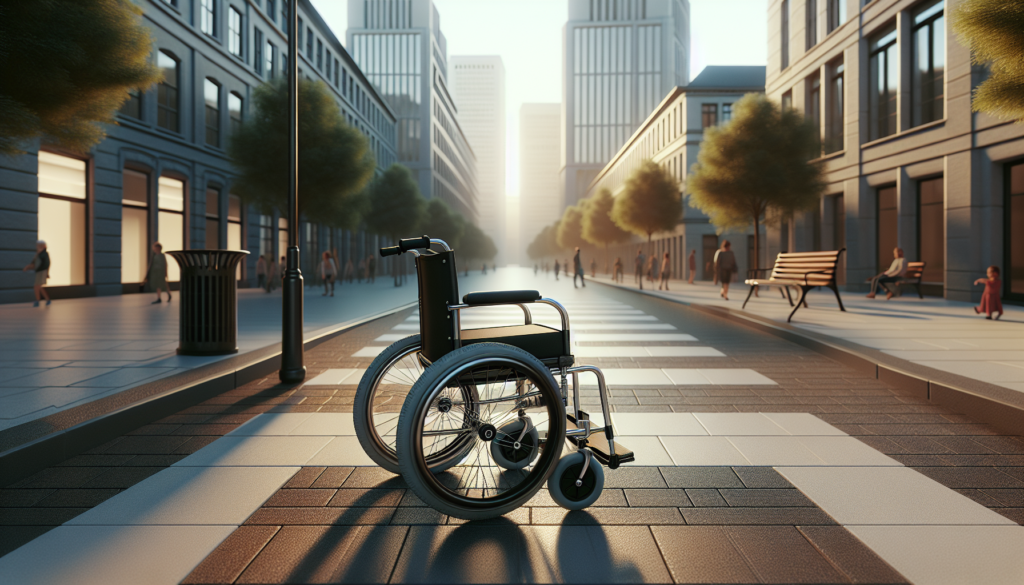
Choosing the right electric wheelchair can significantly enhance mobility and independence for those in need. With a variety of options available in the market, it’s essential to focus on factors like battery type, range per charge, weight, and climbing ability. Whether you are considering models like the Edegree EW6, known for its lightweight design, or the Stonbike TU-04, which boasts an impressive climbing ability, each wheelchair has unique features tailored to different user needs. This comprehensive guide by EKO Life MY will provide valuable insights and tips on how to select the best electric wheelchair that fits your lifestyle and requirements, ensuring you make an informed decision.
Understanding Your Needs: Range and Load Capacity
When selecting the perfect electric wheelchair, understanding your needs in terms of range and load capacity is paramount. The range per charge determines how far you can travel on a single battery charge, which is essential for maintaining your independence. For instance, the Edegree EW1 has a range of 20 km, making it suitable for short outings and errands, while the Edegree EW6 offers 10-15 km.
On the other hand, the Stonbike TU-04 stands out with an impressive range of 25 km, giving users the ability to explore larger areas without the constant worry of battery depletion. Your choice here should align with your daily activities and the distances you plan to cover regularly. Furthermore, consider the maximum load capacity of the electric wheelchair; all three models can support weights up to 100-150 kg. This ensures not only safety but also stability while navigating through different terrains.
As you evaluate your options, also take note of how these features correspond to your lifestyle and specific requirements. Will you need a wheelchair that handles steep inclines? The Edegree EW1 and Stonbike TU-04 feature climbing abilities of 13° and 25° respectively, making them excellent options for hilly environments. Additionally, review the weight of the wheelchair itself, as heavier models may be more cumbersome to transport or maneuver. By carefully examining these features, you can find an electric wheelchair that meets your unique needs and enhances your mobility and independence.
Battery Types Explained: Lithium vs. Lead-Acid
When selecting the best electric wheelchair, one of the crucial aspects to consider is the type of battery it uses. Lithium batteries are known for their lightweight nature, fast charging times, and longer lifespan. For instance, the Edegree EW6 uses a lithium battery with a charging duration of just 6 to 8 hours, allowing users to travel ranges of 10-15 km on a single charge. This is particularly advantageous for individuals who need their electric wheelchair for daily activities, as it ensures a prolonged usage without frequent recharges.
Additionally, lithium batteries tend to maintain their performance and efficiency over time, making them a sustainable choice for daily mobility solutions. On the other hand, lead-acid batteries, while often less expensive, tend to be bulkier and heavier. For example, the Edegree EW1, which utilizes a lead-acid battery, weighs 38 kg and requires a charging time of only 6 hours to achieve a 20 km range. It offers decent climbing capabilities but might not be as efficient in terms of weight and longevity compared to lithium options. Ultimately, choosing between lithium and lead-acid batteries in electric wheelchairs involves weighing factors such as weight, range, charging time, and overall user convenience.
Charging Time: What You Need to Know

When selecting an electric wheelchair, one of the critical factors to consider is the charging time of the battery. Different models have varying charging durations that significantly impact usability and convenience. For instance, the Edegree EW6 requires 6 to 8 hours for a full charge, providing a range of 10-15 km, which is ideal for short outings. On the other hand, the Stonbike TU-04 offers a quicker charging time of 3 to 5 hours and enhances mobility with a range of 25 km per charge. This convenience allows users to spend less time waiting for their wheelchair to recharge and more time on the move, thus maximizing independence and comfort in daily life.
Additionally, it is essential to consider the type of battery used in each electric wheelchair, as this can affect both charging times and overall performance. The Edegree EW1, equipped with a lead-acid battery, charges in 6 hours, making it suitable for users who may require an extended range of around 20 km. Understanding the charging needs based on personal mobility requirements and daily routines will ultimately guide you to the electric wheelchair that best suits your lifestyle, ensuring optimal freedom and accessibility wherever you go.
Speed and Climbing Ability: Matching with Your Lifestyle
When selecting an electric wheelchair, understanding the speed and climbing ability is crucial for matching the device with your lifestyle needs. For individuals who frequently navigate through urban areas or require quick mobility, a wheelchair like the Edegree EW1 or Edegree EW6 could be ideal, with forward speeds of up to 8 km/h. The Edegree EW1 offers a climbing ability of 13°, which is suitable for mild slopes, while the Edegree EW6 is designed for a lesser incline, making it more appropriate for flat terrain.
On the other hand, if you often encounter steep gradients, the Stonbike TU-04 stands out with a climbing ability of 25° and a comparable speed of 6 km/h, thereby offering both efficiency and powerful performance in more challenging environments. Additionally, consider how often you will be using the wheelchair for outdoor versus indoor settings.
The Edegree EW6 has a range of 10-15 km per charge, making it perfect for short trips, while the Stonbike TU-04, with a 25 km range, provides greater freedom for longer excursions. Weighing in at 28 kg, the Stonbike TU-04 also supports a higher max load of 150 kg. Therefore, balancing speed, climbing ability, and battery life with your physical requirements ensures you choose the electric wheelchair that’s truly tailored to your lifestyle.
Weight Considerations: Finding the Right Fit
When selecting the right electric wheelchair, weight considerations are crucial to ensure both comfort and usability. Each model comes with its own weight specifications, and it’s essential to choose a wheelchair that suits your body type and daily needs. For instance, the Edegree EW6 weighs 14.8 kg, making it lightweight and easy to maneuver, while providing a max load capacity of 100 kg. In contrast, the Edegree EW1, which weighs 38 kg, still supports a max load of 100 kg but may require more strength to manage due to its heavier frame.
Understanding that your electric wheelchair should accommodate your weight comfortably ensures that you have a stable and secure experience while using it. The Stonbike TU-04, weighing 28 kg, balances durability and support with a max load of 150 kg. Adequate weight also plays a role in performance; lighter models like the Edegree EW6 can navigate smoother on flat surfaces, while heavier ones like the Edegree EW1 and Stonbike TU-04 may provide added stability on uneven terrains. Ultimately, weighing your options based on your weight and the wheelchair’s specifications will lead you to the perfect fit for your mobility needs, making your day-to-day activities much more manageable.
Motor Power and Performance: Dual Motors Explained

When selecting an electric wheelchair, understanding the motor power and performance is crucial, particularly when it involves dual motors. These motors significantly enhance mobility by providing superior torque and speed, which is particularly beneficial for navigating various terrains. For instance, the Edegree EW1 features a dual motor with a capacity of 24v250w, enabling a climbing ability of 13 degrees, which suits users needing to conquer more challenging landscapes.
On the other hand, the Edegree EW6, equipped with a dual motor of 24v190w, may not climb as steeply but allows for a smooth ride, allowing users to maneuver through urban environments efficiently with a speed of up to 8 km/h. Dual motors also play a vital role in determining overall range and stability. The Stonbike TU-04, with a more powerful dual motor configuration, offers an impressive climbing ability of 25 degrees and a range of 25 km per charge, providing users with greater freedom to explore without the worry of battery depletion.
By evaluating the dual motor specifications, one can ensure that the selected electric wheelchair aligns with their specific needs, enhancing both functionality and comfort throughout daily activities.
Cost Analysis: Comparing Features and Prices
When choosing the best electric wheelchair, it’s crucial to conduct a cost analysis that compares various models based on their features and prices. For instance, the Edegree EW6, priced at RM 4,388, offers a range per charge of 10-15 km with a dual motor system and impressive climbing ability, making it suitable for varied terrains. On the other hand, the Edegree EW1, available for RM 2,499, provides a longer range of 20 km but utilizes a lead-acid battery which generally has a shorter lifespan than lithium batteries. It’s important to weigh these features against your specific needs and how often you plan to use the wheelchair.
Additionally, while the Stonbike TU-04 also retails for RM 2,499 and provides a higher climbing ability of 25°, its lighter weight and faster charging time can be beneficial for users looking for convenience and portability. Ultimately, understanding the features and capabilities of each electric wheelchair model can guide you in making an informed decision. By being mindful of the price points and carefully considering aspects like battery type, weight, and speed, you can find a wheelchair that meets your requirements without compromising on quality. Take the time to analyze each option, as investing in the right wheelchair is vital for enhancing mobility and improving overall quality of life.
User Comfort and Additional Features: Making the Right Choice
When selecting an electric wheelchair, user comfort and additional features should be at the forefront of your decision-making process. A comfortable chair is essential for daily use, particularly for those who may spend extended periods in their wheelchair. The weight of the wheelchair, like the Edegree EW6 at 14.8kg and the heavier Edegree EW1 at 38kg, can affect maneuverability and ease of use.
Additionally, consider the seat design, cushion type, and adjustability to ensure proper support and comfort during use. Look for models that offer a smooth ride with adjustable settings that allow you to tailor the experience to your needs, such as the Edegree’s dual motor system which can adapt to various terrains and incline levels up to 10 degrees.
Final Thoughts on Choosing the Right Electric Wheelchair

Selecting the ideal electric wheelchair is crucial for enhancing mobility and independence. As we’ve explored throughout this guide, factors such as battery type, range per charge, weight, and climbing ability are essential to consider when making your decision. Take the Edegree EW6, for instance, which offers a decent range of 10-15 km with a lithium battery, and is compact at 14.8 kg. On the other hand, if a longer range is on your priority list, the Stonbike TU-04 provides an impressive 25 km range with a robust climbing ability suitable for various terrains.
Each wheelchair has its unique features, ultimately tailoring to different needs and preferences. When making your choice, it’s important to test the wheelchair if possible, assess how it fits into your daily life, and ensure it meets your specific mobility requirements. Whether you prioritize speed, weight, or battery efficiency, finding the right electric wheelchair can significantly improve your quality of life. Remember, versatility matters, and the right model will empower you to navigate through life with confidence and ease.

I couldn’t find any information about the blog summary. Perhaps it’s not available yet?
Thank you for reaching out, Zara. We appreciate your feedback as it helps us improve. Our blog summary is still in the process of being updated, but we’ll make sure to add it soon. If you have any specific topics you’d like to see covered, feel free to let us know! For any questions or concerns regarding our products or services, please don’t hesitate to contact us directly via [email protected] or +60 3-7890 3042.
I’m really disappointed that there’s no blog summary to read. It would be great if the author could provide a brief overview.
Hi Raja Jekal, thank you for letting us know that there’s no blog summary. I’ve taken note of your suggestion and will ensure that our future posts have a brief overview. If you’re looking for a summary of our blog, you can visit our website where you’ll find information on Eko Life Malaysia – empowering bicycle, ebike, and escooter enthusiast through affordability, quality products, professional servicing, and forging communities.
Do we need to subscribe or register to read this blog summary? It’s not showing up for me.
Hello Sophie, thank you for reaching out to us. Unfortunately, it seems that you may need to register with our website in order to access our blog summaries. You can easily register by clicking on the ‘Sign In’ or ‘Register’ button at the top right corner of our website, then follow the prompts to create your account. If you have any difficulties during registration, please feel free to reach out to us via email at [email protected] or call us at +60 3-7890 3042. We’re here to help!